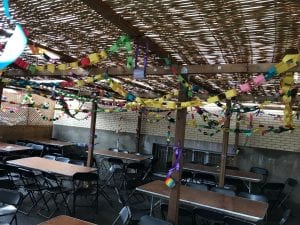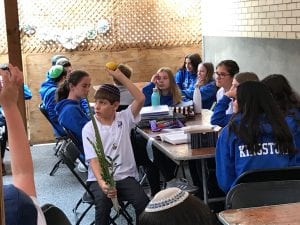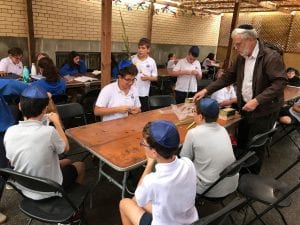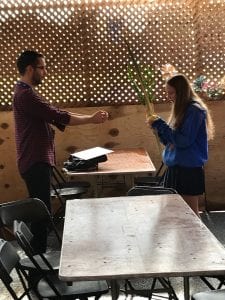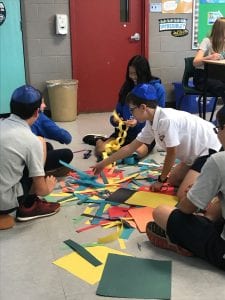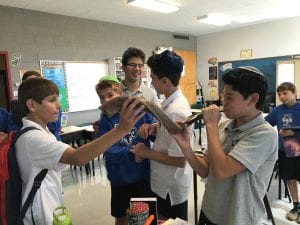First assignment found on middle school blog dealing with the Shema and questions. Due on Friday, Oct.5.
Assignment #2 due on Friday, Oct. 12-continuing questions on the shema. Question #`-In sentence 2 of the Shema, how can the words of the Shema be inscribed on somebody’s heart? How does Rashi interpret the word, Hayom, today in referring to the words of Shema?
Assignment #3-Go to sefaria site and click onto Talmud , Seder Nashim, and go to Gittin 45 A (middle of the page) and answer the following based on the Mishnah: Due Friday, Oct. 19.
Why is the Mishna concerned with how much money should be raised to redeem hostages?
Why does the Mishna express concern with trying to free hostages?
How do you evaluate the value of a human being?
Should Israel have rescued the hostages in Entebbe in 1976?
Assignment #4- Questions based on the mishna in Gittin 45A regarding hostages.
Why is it considered Tikkun Olam when the mishna puts a restriction on how much money can be paid to redeem a hostage?
Google the Maharam of Rotenburg and demonstrate how his story of being held hostage relates to our mishna.
What are some of the issues that are raised in regarding enabling hostages to flee their captors?
What is the difference between the reasoning of the unnamed rabbi of the mishna and Rabban Shimon ben Gamliel as to why one should not attempt to free hostages by the use of violence? (check commentaries on the side of the page to see differences). Assignment due Oct.26.
TEST-due NOV.5 Research and answer the following questions:
Sefaria-Tanach-Leviticus, chapter 19, verse 16-second half of sentence.
What does the Torah mean when it says that one shall not stand by idly as another’ blood is being spilled? Click on commentaries and explain the opinions of Rashi and the Ibn Ezra. What do you think the sentence means?
What is a Rodef? You can check sources such as Wikipedia, Jewish Virtual LIbrary.
Is there a connection between the law of not standing by idly when one’s blood is being spilled to the Rodef?
How do one benefit the Rodef if someone kills him? How is the victim benefitted? (Talmud, Sanhedrin, 73A- MIshna at the top of the page.
Normally, if someone tells us to violate a mitzvah or die, we violate the mitzvah in order to remain alive. Three exceptions where one gives up one’s life rather than violate the law are: idolatry, adultery, murder. If one is told to violate any of these three laws, one must give up one’s life. (Talmud, Sanhedrin 74A)
Questions on the above paragraph: During the Holocaust, many Jews had the opportunity to receive false baptismal certificates to say that they were actually Christian. They asked their rabbi if they could receive these certificates. What do you think the rabbi answered them as relating to the paragraph above citing the law from Talmud, Sanhedrin, 74A? What would you have answered these Jews? What would you have done under the same circumstances?
Assignment #6-review of previous texts. Deeper analysis of the mishna on Sanhedrin 73A and the gemara on 74a looking at the concept of yehareg va’a’ yaavor, sheat hashmad, arketa demesana.’ We are going to look at the actual text, and deal with the historical examples of the Marranos of Spain and Portugal, and the Ashkenazic Jews who chose different pathways when facing these issues. We will also be looking at the Rambam, Mishne Torah, Hilchot Yesodei HaTorah, chapter five to look at specific examples to be examined.
Assignment #7- Mishne Torah, Rambam, chapter 5 looking at the concept of chilul Hashem and kiddush Hashem. How are these terms defined? Kiddush Hashem-Pittsburgh eleven Jews-agree or disagree? chilul Hashem- Jew robs a bank.
In chapter 5, in the last paragraph, the Rambam writes the following:
One can be guilty of Chilul Hashem, the desecration of G-d’s name, if the person committing the action is known to be a Torah scholar. Even if the action is not necessarily wrong, people will say that it is. Example: one who buys something and does not pay for it immediately. Another example could be a Torah scholar who is argumentative, or who does not speak nicely to people.
Questions for Assignment #7- What is chilul Hashem? Can you give examples other than what the Rambam mentioned? What is Kiddush Hashem? (Look in chapter 5, first paragraph) What are two examples of Kiddush Hashem?
Why would the Talmud say that if a Torah scholar violates the law, the people of the community will blame the Torah and not him?
Assignment due: Nov.26
Assignment #8 Sefaria Talmud Shabbat 21b-you could find the full discussion under the category called ‘topics’ and click onto Chanukah. I would like you to analyze the first eight sections quoted from the Talmud in regard to Chanukah, and deal with the following questions: Why does the Talmud not emphasize the victory over the Greeks and emphasizes instead the miracle of the oil?
What is the reasoning of Beit Shammai and Beit Hillel as to how they light the chanukiyah?
What is the concept of Mehadrin and Mehadrin min Hamehadrin in relation to how many candles are lit every night?
What connection is there between the story of Chanukah and women as being part of the miracle of Chanukah? Google Judith and Heliophernes and see what you find.
Assignment #9- Talmud Bava Metzia 59b-Story of Rabbi Eliezer Hagadol. Questions: What kinds of proofs did Rabbi Eliezer bring to show he was right, and why did the rabbis reject his proofs?
Why did G-d feel He had been defeated by the rabbis?
What did the rabbis do to Rabbi Eliezer who refused to accept their interpretation of the law?
The Talmud tells the story about a ship containing several rabbis that was about to sink. What is the connection between this story and the debate between Rabbi Eliezer and the rabbis?
Is Machloket (disagreement) a good thing or a bad thing?
Part II will be to compare the story of Rabbi Eliezer with the story of Korah in sefer bamidbar (the book of Numbers).
Part II- Korach- Bamidbar (Numbers 16, beginning of chapter.) The people of Israel have been condemned to remain in the desert for forty years having accepted the false account of the ten spies (out of 12) that Moshe sent out to scout the future land of Israel.
Korach now leads a rebellion against Moshe and Aaron’s authority, claiming they have taken the best leadership positions in the community, that of leader and that of Kohen Gadol.. Korach leads the people of Israel in rebellion against Moshe and Aharon. Korach and his group of 250 people are killed, swallowed up by the earth.
In Pirkei Avot, Ethics of the Fathers, we are told that the Machloket of Korah was not sincere, while the machloket of HIllel and Shamai on points of Jewish law is sincere. Do you see any connection or comparison between the story of Rabbi Eliezer who was excommunicated and the story of Korach who was killed for rebelling against Moshe and Aaron? Why or why not?
We reviewed the account in Talmud Eruvin 13B in regard to the nature of the machloket between Beit Shammai and Beit HIllel and how a voice from heaven resolved the debate . We drew comparisons and contrasts between the case of Rabbi Eliezer and the machloket of Beit HIllel and Beit Shamai.
Assignment #10- Sefaria-Devarim, Deuteronomy chapter 16,verse 18,etc.
Why is there a need to have police and judges in a community?
What should a judge do or not do?
Why does the Torah state twice, ‘justice, justice you shall pursue’?
Cite three examples of a lack of justice in the world. Explain your answer.
Rambam, Mishne Torah, seder Mishpatim, Laws of Sanhedrin, chapter 23, laws 1,2, 8,9
Why is bribery considered to be such a serious crime? Can a judge take a bribe even if he will judge fairly?
Why should a judge feel that there is a sword hanging over his head, and that the gates of purgatory are open below him?
Can a judge say that he does not want to judge a certain case?
Draw up a code of conduct for a judge. (in class assignment)
Concept of Dina Demalchuta Dina- statement by Shmuel in Bava Kamma 113B. The law of the land is the law.
What kinds of cases do you think this principle would apply, and in what kinds of cases would this principle not apply?
If the law of the land contradicts the laws of Judaism, do we follow the laws of the land or do we obey the laws of Judaism? Be careful with your answer. Research the topic and see what kinds of cases we are talking about when we say the law of the land is the law.
Assignment #11- due on Friday, Jan.18
Abortion and Jewish law- What are some of the issues of controversy surrounding abortion? I would like groups of 2-3 to work on this topic perhaps creating a video or live presentation presenting different points of view regarding this toplc with questions posed by your fellow students.
Sources we shall be examining in class- Bereshit, 9:6
Shemot, 21:22
Talmud Sanhedrin 91B discussion of Antony and Rabbi
Talmud Arachin 7A-Mishna dealing with woman condemned to death by court.
MIshna Oholot 7:6
Concept in Talmudic law: the fetus is considered to be part of the mother. At what point do we save the life of the mother over that of the fetus, and at what point do we save the life of the baby over that of the mother?
Review of the sources in Sanhedrin and Arachin-see above.
Wednesday-in class assignment on the topic of abortion and Jewish law to be completed at home if not finished in class. The assignment will involve a case concerning abortion and Jewish law. You will be asked to apply your knowledge and use of sources to aid in your answers to the questions posed. You may use all sources that we have used in class.
Tu bishvat- concept of shivat haminim, maaser, terumah, shemitta,
Laws of berachot
Sources-Torah and Mishna
IN CLASS ASSIGNMENT- Wednesday, January 23
We have discussed in class various Halachic approaches to the question of abortion and Jewish law. Answer the following questions and use sources to support your responses:
- Would Jewish law consider abortion to be murder?
- Under what conditions could abortion be allowed under Jewish law?
- What conditions would not allow for abortion to be performed?
- When does life begin according to the debate between Antony and Rabbi? (See source from Sanhedrin 91b)
- What kinds of questions should one be asking as to whether an abortion should or should not be performed? What do you feel?
Monday, January 28-Kiddushin mishna 39b comparison with mishna Peah 1:1 and Gemara Shabbat 127A- Discussion regarding terms mentioned in the mishna and gemara-olam hazeh, olam haba, peah, gemillut chasadim,kibud av va-em, hachnasat orchim, bikur cholim, hachnasat kallah, shalom, talmud torah.
Wednesday, January 30-Plagiarism and Jewish Law-Research defintion of plagiarism. What are the issues? Examine a responsa from Rabbi Moshe Feinstein, Igrot Moshe, Choshen Mishpat,2:30:
It is forbidden to steal the answers to the state exam both from a secular legal point of view, and according to the laws of the Torah. This is not only cheating (geneivat daat), but can prove deceptive in getting a job in the future which might be based on one’s grades in school.
What are the points Rabbi Feinstein is making regarding cheating and by extension. plagiarism? How does this topic tie in to the issue of misquoting sources, or not attributing sources to that which is being quoted? This week’s parsha: Midvar Sheker Tirchak 23:7.
Feb.1-Parshat Hashavua-mishpatim- review of the role of the bet din, slavery, capital punishment, abortion, private and public property laws, guardianship, damages, self-defense, kashrut, naase venishma.
Feb.4- Concept of Tikkun Olam=What is the origin of the term? Examine second paragraph of Alenu. What is the meaning of the term in Lurian Kabbalah? What is the meaning in the time of the Talmud? What does it mean today? Is the use of the term today overblown? Look in mIshnayot of Gittin, chapter 4 dealing with examples of tikkun olam. Which meaning is closest to how we understand it today?
Feb. 6- Ethics topic-Lying. Refer to BBC website dealing with ethics. What are some of the ethical issues concerning lying? What are some of the reasons people lie? Is it ever right to lie? Examine the arguments cited on the BBC website, and compare to the Jewish concept of Midvar Sheker Tirchak- distancing from lies.
Is there a moral difference between telling a white lie and a regular lie? Can one lie to save one’s life? Is it okay to lie to gain a good job or advance in one’s career, school, etc.?
Feb 11-Moot Bet Din case involving snapchat with sources. Review case with class. Check emails for case and sources based on case with assignment to draw up questions based on the case. Break up class into groups dealing with questions.
Feb. 25- Review case study for Moot Bet Din. Secondly, concentrate on the book of Esther dealing with the following controversial questions:
How could Esther marry the king being that she was Jewish and possibly married to Mordechai?
What kind of Jewish community existed in the Persia of our story? Are there similarities to today’s Jewish community? Yes or no?
How is anti-Semitism of Haman different from that of the Greeks?
How does anti-Semitism manifest itself today?
Why is there no mention of G-d’s name in the Megillah? Why is this book in the Tanach?
Why did the Rabbis in Israel at first refuse to include the book of Esther in the Tanach?
Mar.4- Chagigah 14b -Four who entered pardes-research on the life of Elisha ben Avuyah
Parshat Hashavua-Pekudei
Kiddushin 29a-b- mitzvot ase and lo taaseh zman grama or not
Vaccination and Jewish law -ethical issues involved- health, jewish law, school admission or not, autism, societal protection, individual choice
Mar.11- gemara kiddushin 29-a-b (see previous posting)
Mar.13-What do we mean by time oriented mitzvot and non-time oriented mitzvot? What are some examples of each?
Do a comparison study of the two mishnayot in Kiddushin 29A and Berachot 20A. Why does the mishna in Berachot 20A (at the bottom of the page) mention tefillin as an exemption for women?
Do you think the term ‘exempt’ prevents one from performing the mitzvah? If we say that women are exempt from performing time oriented positive mitzvot, why are they obligated in the observance of Shabbat and the holidays?
Review of Hilchot Purim with review of laws connected to Parshat Zachor- use of Sefaria text on Shemot 17, Devarim 25 and Shmuel I, perek 16 What are some of the moral and ethical issues that can be derived from these accounts? What are laws connected to Zachor?
Mikra Megillah, mishloach manot, matanot laevyonim, seudat Purim
mar, 13- parashat hashavua- vayikra and parshat Zachor review. laws of Purim, see above. Continuation on topics of mitzvot aseh she-hazman grama, etc. doing a comparison study of texts in Berachot and Kiddushin.
Mar. 18- Continuation on topics of mitzvot aseh she-hazman gerama. see above.
Laws of Purim -Fast of Esther
Should Bibi team up with Otzma Yehudit party to win election in Israel? Discussion of how to deal with Arab Israeli conflict in upcoming election. Racism versus peace movement. issues
Mar. 22- beginning of study of arvei pesachim, chap. 10 Pesachim covering following topics connected to the seder in the first mishna
Mincha ketanah, Mincha Gedolah, Shkeiah, Tzeit Hacochavim, Plag Hamincha, alot hashachar, netz hachamah.
Parshat Hashavua-Tzav-Korban Todah.
Mar. 29 Parshat Hashavua, Shmini and Parah, deaths of Aaron’s sons, kashrut, tumah and tahara, mishna-Pesachim 10:1
April 1- Laws of Pesach=preparing the house for Pesach-cleaning, kashering, bedikah- biur-bitul chametz. Definition of chametz- Chametz be’en, taaruvet chametz, chametz bemashehu, mechirat chametz, Types of kashering- libun, hagaloh, irui, milui veirui,
April 5- Homework assignment based on mishna in Pesachim, chapter 10. Answer the following questions: (Due April 5)
What factors would you use in trying to figure out how long a ‘Jewish’ hour is according to Jewish law?
How is it possible for one hour to be 48 minutes during one part of the year, and for it to 75 minutes another time of the year?
What kind of food should one not consume after the last time it is permitted for one to eat chametz on erev Pesach?
What kind of food should the community provide the poor for Passover?
Regarding Kiddush for the Seder night, what are the opinions of Beit Hillel and Beit Shamai and why do they reach their conclusions?
April 10-Pesach-Laws of the seder- review of the various steps of the Haggadah using the Sefaria text to analyze the following: Items on seder plate and reasoning behind them, how to prepare them. Kadesh- laws of the four cups of wine, size of cup, how much to drink, type of wine or grape juice used. Concept of reclining on left side and reason. To what parts of the seder does reclining apply? What to do this year on Friday night re:Kiddush and Havdalah on Saturday night. When to light candles first and second nights of Pesach. Why do we wash our hands prior to the eating of the karpas? The four questions and why we ask them. Concept-Magid.
In summary the questions are:
- How do you prepare the items on the seder plate? What do they represent?
- How much does one drink of each of the four cups and what does each cup symbolize?
- Why do we recline on the left side when we drink the wine?
- What do we add to the Friday night kiddush on the first day of Pesach, and what do we add to the Saturday night kiddush, the second day of Pesach?
- Why do we wash our hands prior to eating of the karpas?
Sources you may use to discuss the topics above: www.aish.com-laws of the seder, www.jtsa.edu-laws of passover, www.ohr.edu-laws of fhe seder, wikipedia, jewish virtual library, ou.org/pesach.- In class asssignment to be started Friday, May 3.
april 29- Theological discussions in regard to the Shoah-Examination of two specific theories-1) umipnei chataeinu
2) evil of man not of G-d’
Story of Job
May 1-continuation of discussion of theological bases for the Shoah
Story of Job- Questions to answer- Chapter one: Describe the type of life style Job had, Would you say Job was a religious man? What kind of discussion was taking place in the heavens about Job? What arguments does the Satan use against Job? What is the Satan according to Judaism? (Research topic) Why does Hashem defend Job against the Satan? What does the Satan ask Hashem to allow him to do to Job in order to test his faith? What catastrophes befell Job? How did he react, and how did his wife react? Why does the Satan constantly try to test Job’s faith? Why does Job curse the day of his birth? How do his friends who come to console him try to explain all the catastrophes that befell Job? What is the relationship between the book of Job and the Shoah?
May 6-What arguments do Job’s friends use to console Job? What remark do they make about Job’s religious beliefs? Why does Job refuse to accept their consolation? What kind of statements should or should not be made in a shiva house? What is the proper protocol for behaviour in a shiva house? How do you answer the question of ‘why’?
Concepts of Menuval Birshut HaTorah, kedusha, morah av vaem, lifnei iver, tzedek bamishpat uvamishkal, lo taamod, hochacha, vehavta leraacha comacha, shaatnez, grudges.
May 12- Discussion regarding final exam. Deuteronomy, chapter 17- sentences. Research the following questions: What is the attitude of the Torah to having a monarch rule the people of Israel? What restrictions are there on the king according to Jewish law? Do a comparison study with the account of the king’s rights as mentioned in Samuel I, chapter 8 and answer the following questions: 1) If the Torah allows for the selection of a king, why does Samuel the Prophet object when the people ask for a king? What rights does the king have which are described in the book of Samuel which are not mentioned in Devarim? Which system of government do you believe is the best and why? What kind of government does the state of Israel have today? Due date-May 24.
Parshat hashavua-Emor- Dinei Kehuna, chilul Hashem and Kiddush Hashem, story of the fight over land at the end of the parsha.
May 22-Preparation for Shavuot- What is shavuot? why do we celebrate it? Why does the Torah not give a specific date for the holiday? What day of what month is it celebrated? How many days of the Omer are there? What happened on Shavuot? Why is Divine Revelation so important in Judaism? What are some of the Ten Commandments? Why is it customary to eat dairy on Shavuot? What are some of the names given to this holiday and why? Why do people stay up all night and learn Torah the first night of Shavuot? Why is it customary to eat dairy on this holiday? Why do we read the book of Ruth on Shavuot?
Book of Ruth- Who was Ruth? What is her connection to the holiday of Shavuot? What do we understand from her comments to Naomi about converting to Judaism? What is the connection between the conversion story of Ruth to modern day conversion issues? Why is Ruth known as the prime example of Chesed?
Review list of students who have not handed in their summatives-study hall work.
May 31-brief discussion about Bechukotai, discussion about final exam and expectations in terms of use of sources. Continuation of book of Ruth-chapter 2 dealing with following areas of halacha: Chesed, leket, peah, schichacha. With use of Sefaria, answer the following questions:Why did Ruth go to gather grain in the fields? What promises did Boaz make Ruth? What answer did Boaz give Ruth as to why he was encouraging her to gather grain from his field rather than from other people’s fields? What chesed did Ruth perform for Naomi?
June 3-reference back to previous lesson on Ruth. Research why is chesed such an important concept in Judaism. Chesed olam yibaneh.
Moses ben Jacob Cordovero‘s kabbalistic treatise Tomer Devorah, the following are actions undertaken in imitation of the qualities of Chesed:[13]
- love God so completely that one will never forsake His service for any reason
- provide a child with all the necessities of their sustenance and love the child
- circumcise a child
- visiting and healing the sick
- giving charity to the poor
- offering hospitality to strangers
- attending to the dead
- bringing a bride to the chuppah marriage ceremony
- making peace between a person and another human being.
parashat hashavua bemidbar- census
development of halacha sheets


